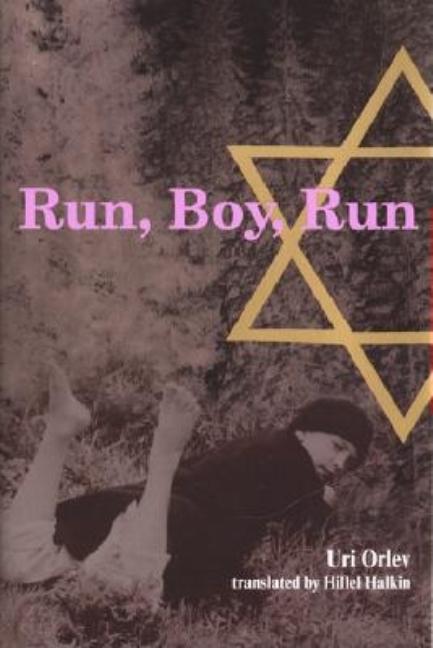Book Descriptions
for Run, Boy, Run by Uri Orlev
From Cooperative Children's Book Center (CCBC)
Srulik escapes from the Warsaw ghetto in the back of a farmer’s cart. It’s not a planned escape, it just happens in a few frenzied moments when something changes and danger is suddenly imminent. Someone yells “Run!” or “Jump!” and the small boy responds. In much of Uri Orlev’s exceptional novel about the Holocaust, this is how things go for Srulik—he is buffeted by circumstance. Sometimes it lands him in the hands of someone with compassion, like the Polish farmer who was driving the cart. Sometimes it delivers him into the hands of one who will hate him or fear him simply because he is a Jew. But as time goes on and Srulik grows older—older than any small boy should have to be—he begins to play an active role in his own survival, growing cunning out of circumstance and need. Srulik spends the duration of the war in a series of small Polish villages and the surrounding woods. Many of the people he meets know his secret but willingly help him; others fool themselves into thinking what they want for the sake of the cheap labor he provides. But always, eventually, someone betrays him, and then he’s on the run again. During one of his escapes, lying low in field while the Germans search nearby, he meets another Jew—it is, amazingly, his father. “Forget your name,” his father urgently tells him, giving Srulik the Christian name Jurek and instructing him to learn how to pray like a Christian. “But...never forget that you’re a Jew.” Srulik—still so young—takes his father’s words to heart. By the war’s end, he’s not only lost an arm to the Nazis, he’s lost all memory of his Jewish name as well as the family he once had in another lifetime. Srulik doesn’t want to remember, but eventually, painfully, he does. There’s a sense of triumph at the conclusion of this harrowing novel, in Orlev’s epilogue, which tells how he came to hear the true story on which the book is based. It was originally published in Israel and has been translated into English from Hebrew. (Ages 10–14)
CCBC Choices 2004 . © Cooperative Children's Book Center, Univ. of Wisconsin - Madison, 2004. Used with permission.
From the Publisher
“'Srulik, there’s no time. I want you to remember what I’m going to tell you. You have to stay alive. You have to! Get someone to teach you how to act like a Christian, how to cross yourself and pray. . . . The most important thing, Srulik,' he said, talking fast, 'is to forget your name. Wipe it from your memory. . . . But even if you forget everything—even if you forget me and Mama—never forget that you’re a Jew.'"
And so, at only eight years old, Srulik Frydman says goodbye to his father for the last time and becomes Jurek Staniak, an orphan on the run in the Polish countryside at the height of the Holocaust. With the danger of capture by German soldiers ever-present, Jurek must fight against starvation, the punishing Polish winters, and widespread anti-Semitism as he desperately searches for refuge. Told with the unflinching honesty and unique perspective of such a young child, Run, Boy, Run is the extraordinary account of one boy’s struggle to stay alive in the face of almost insurmountable odds—a story all the more incredible because it is true.
And so, at only eight years old, Srulik Frydman says goodbye to his father for the last time and becomes Jurek Staniak, an orphan on the run in the Polish countryside at the height of the Holocaust. With the danger of capture by German soldiers ever-present, Jurek must fight against starvation, the punishing Polish winters, and widespread anti-Semitism as he desperately searches for refuge. Told with the unflinching honesty and unique perspective of such a young child, Run, Boy, Run is the extraordinary account of one boy’s struggle to stay alive in the face of almost insurmountable odds—a story all the more incredible because it is true.
Publisher description retrieved from Google Books.


